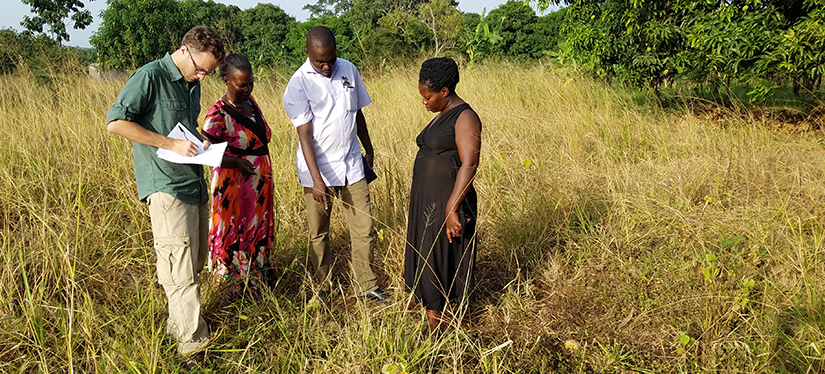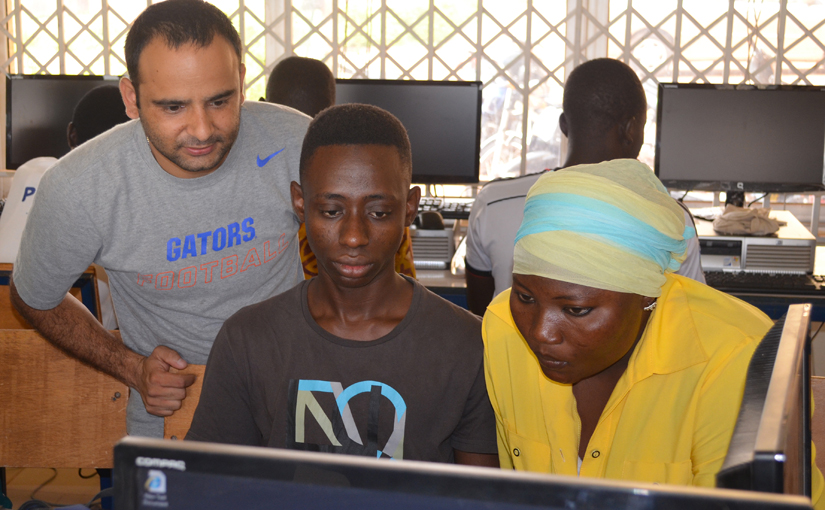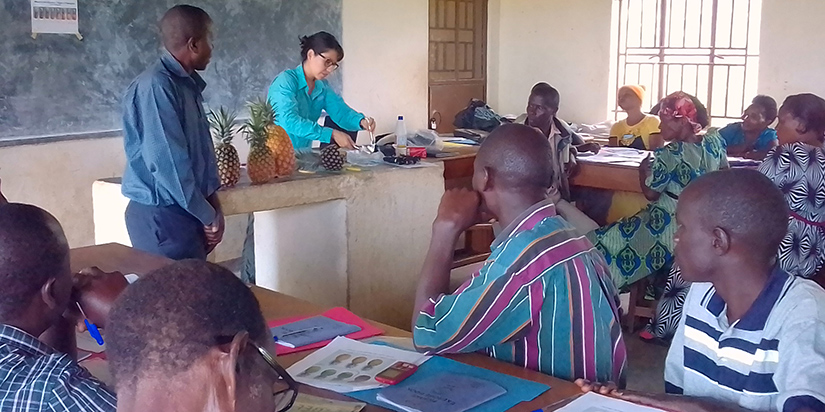
15 grants awarded to organizations, matched with 16 new graduate students
Editor's note, Oct. 11, 2018: Months after this original announcement, two changes were made regarding student travel assignments. One of the changes was from a North Carolina State University student who was unable to work on the project, and so a University of Florida student was selected to support the project instead. These changes are reflected below.
The Feed the Future Innovation Lab for Horticulture has awarded 15 new Trellis Fund grants to organizations in Africa and Asia, matching these new projects to 16 graduate students who will provide agriculture expertise requested by the organizations.
The Trellis Fund is a model started by the Horticulture Innovation Lab in 2011 as a way to connect organizations that are well-rooted in their local communities in developing countries with budding agricultural scientists. In addition to helping local farmers, the projects also build the institutional capacity of the organizations and expose graduate students to critical agricultural needs in transitional economies.
Selected organizations each receive $4,000 grants for a wide variety of projects that will help smallholder farmers improve how they grow or sell fruit and vegetable crops.
Selected graduate students serve as consultants on the horticulture projects during 2018, working remotely and also briefly traveling to the project to better understand local context and provide in-person support. As Trellis Fund fellows, the students participate in a preparatory seminar and are also provided travel funds and a $300 stipend upon project completion.
The Horticulture Innovation Lab is led by a team at the University of California, Davis, with funding from the U.S. Agency for International Development, as part of the U.S. government’s global hunger and food security initiative, Feed the Future. Organizations from countries in Africa, Asia and Latin America that are prioritized by Feed the Future were eligible to apply for grant funds. Students from the Horticulture Innovation Lab’s partner institutions — including UC Davis, University of Florida, North Carolina State University, and the University of Hawaiʻi at Mānoa — were eligible to apply as fellows.

Projects supported by University of Florida students and scholars:
Nine Ten UF students and scholars were selected to support eight projects in Ghana, Rwanda, Uganda and Nepal with the Horticulture Innovation Lab. One project in particular will be supported by two UF students who also work closely together as business partners and who will be securing outside funding for the additional student’s travel costs.
- Ghana: The Kumasi Institute of Tropical Agriculture has been awarded a Trellis Fund project, to provide farmer trainings on organic agricultural practices for fruit and vegetable production. Claire Friedrichsen, a UF student pursuing a Ph.D. in Soil and Water Sciences, will travel to Ghana to support this project.
- Ghana: A private company, Tip Top Foods, Ltd., will lead a Trellis Fund project that compares biochar treatments for farming in sandy soils. Saroop Sandhu, a Ph.D. student in the UF Soil and Water Sciences Department, will travel and work in Ghana to support this project.
- Ghana: The University of Cape Coast will lead a Trellis Fund project focused on irrigation and seedling transplanting skills for tomato farmers. Prosanta Dash, a UF student pursuing a Ph.D. in Horticultural Sciences will support this project and travel to Ghana to work with farmers.
- Ghana: Methodist University College Ghana was awarded a Trellis Fund grant for a project focused on training for value-added processing of mango. As an international scholar at the University of Florida studying food technology, Sidrah Rafique was selected to support this project. Rafique provided remote support for this project, but was unable to travel to Ghana. To help complete the project, Nick Reitz of UC Davis traveled to Ghana to provide additional support.
- Rwanda: The University of Rwanda will use a Trellis Fund grant to train horticultural farmers in good agricultural practices (GAPs). Kshitij Khatri, who is pursuing a Ph.D. in horticultural sciences at UF, will travel to Rwanda to support this project.
- Rwanda: An agricultural company, SYBASH, Ltd., has been awarded a Trellis Fund grant to lead trainings in fruit tree planting and production. Sanju Kunwar, a Ph.D. student in the UF Plant Pathology department, will travel to Rwanda to work with farmers in support of this project.
- Uganda: The organization Environmental Conservation and Agricultural Enhancement Uganda (Eco-Agric Uganda) will use a Trellis Fund grant to provide trainings to farmers on small-scale irrigation and postharvest handling of mushrooms and tomatoes. Krishna Bhattarai, a UF graduate student pursuing a Ph.D. in Environmental Horticulture, will travel to Uganda to support this project.
- Uganda: The Ndibwami Integrated Rescue Project will lead a Trellis Fund project that trains farmers in processing pineapple, tomatoes, and passion fruit. This project will be supported by Raminder Kaur, who is pursuing a doctoral degree in the UF Department of Agricultural and Biological Engineering. Also working on this project will be Ranjeet Singh Randhawa, who is pursuing a doctoral degree in Horticultural Sciences and a master’s degree in Agribusiness from the UF Food and Resource Economics Department.
- Nepal: An organization called Aythos, Inc., has been awarded a Trellis Fund grant to provide agribusiness training for kiwi fruit farmers. Bhim Chaulagain, a Ph.D. candidate in the UF Plant Pathology Department, will support this project and travel to his home country of Nepal to work with farmers there.

Projects supported by UC Davis students:
Five UC Davis graduate students were selected to participate in Trellis Fund projects in Uganda, Ethiopia and Nepal with the Horticulture Innovation Lab. The Trellis Fund program is also managed by UC Davis graduate students who work with the Horticulture Innovation Lab management team.
- Uganda: The Teso Women’s Development Enterprise, Ltd., will lead a Trellis Fund project focused on promoting value-addition activities for mangoes and oranges with small-scale fruit farmers. Claire Adkison, a UC Davis graduate student in Horticulture and Agronomy, will travel to Uganda to support this project’s trainings on fruit processing.
- Uganda: The Mwino Group will focus on enhancing shelf-life of fruits and vegetables for off-season supply, during their Trellis Fund project. Traveling to Uganda to support this project will be Annabelle Yu, a UC Davis graduate student pursuing a doctoral degree in Microbiology.
- Uganda: An organization called Uganda Rural Information and Communication Technology (URICT-Uganda) received a Trellis Fund grant to train farmers on pest and disease management for fruit crops. Karla Huerta, a graduate student studying Horticulture and Agronomy in the UC Davis Viticulture and Enology Department, will support the project and travel to Uganda to work with farmers.
- Ethiopia: An organization called Send a Cow Ethiopia will lead a project focused on nutritional benefits of eating sweet potato leaves with its Trellis Fund grant. Lauren Howe, a UC Davis student in International Agricultural Development who is also a graduate assistant for the Horticulture Innovation Lab, will travel to Ethiopia to support this project.
- Nepal: The Center for Agricultural Research and Development-Nepal (CARD-Nepal) has received a Trellis Fund grant for a project focused on training vegetable farmers in soil management practices. Stewart Wilson, who is pursuing a doctoral degree in Soils and Biogeochemistry at UC Davis, will travel to Nepal to work with farmers on soil health.
Project supported by UH Mānoa student:
A UH graduate student has been selected to participate in a Trellis Fund project in Tanzania, through the Horticulture Innovation Lab:
- Tanzania: The Horticultural Research and Training Institute in Tengeru (HORTI Tengeru) will lead a Trellis Fund project focused on promoting mulch use in vegetable production. Traveling to Tanzania to support this project will be Russell Galanti, a master’s student in the Department of Tropical Plant and Soil Sciences at UH Mānoa.
More information:
- Trellis Fund on the Horticulture Innovation Lab website
- Trellis Fund factsheet with 2018 projects (PDF)
- Related blog post with video: UC Davis student connects with Ugandan farmers over pineapple postharvest practices
- Related blog post: UF student helps students in Ghana learn state-of-the-art science
- Related blog post with video: UH Manoa student helps with farmers first soil tests in Nepal
- Related blog post: UC Davis student shares postharvest knowledge, from classroom to mango farm
